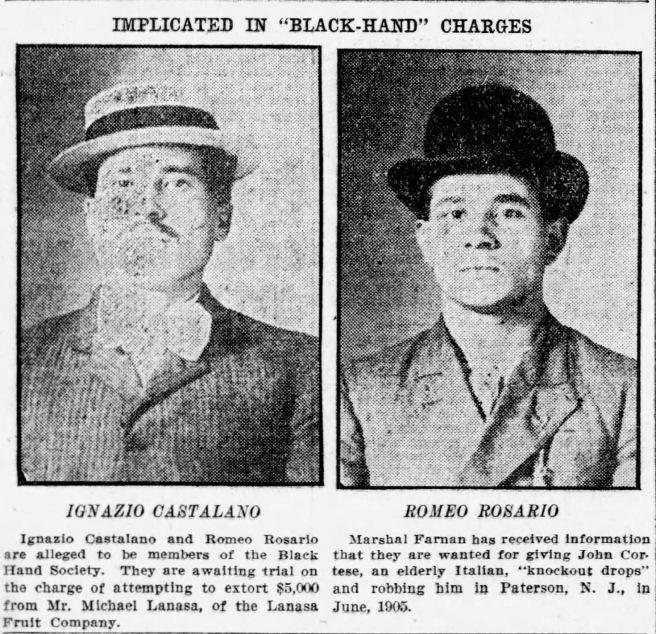Antonio Lanasa received a threatening letter in August 1906. A black cross with the inscription “Everlasting Death” was crudely drawn in ink at the top of the page. Below the cross was written:
“We of the Black Hand advise you once more and no more, because we have waited too long and don’t intend to wait any longer. If you don’t wish any disaster in your family we want $5,000. You must give it to the man you saw last week. This is the last time. Don’t do like many others do or you will regret it. We want it at 12 o’clock August 14. We know you. We sign ourselves, “The Head of the Black Hand and Company.”
Antonio was the owner of a fruit importing business in Baltimore, Maryland. He and his elderly parents, Michael and Giuseppa, had received a similar letter a few weeks earlier. They turned the letter over to the Baltimore police.

After the arrival of the second threatening letter, the Lanasa family became very alarmed. Giuseppa Lanasa sent a message back that she would pay as much as she could. A few days later a man showed up at the Lanasa’s home. He confronted Mrs. Lanasa and demanded the money. When she told him she didn’t have it, he thrust another letter into her hands and quickly left. She immediately located a policeman, who caught up with the man and arrested him.
The man, Ignazio Castellano, claimed to be a recent immigrant to America from Italy. After he was arrested he was searched and officers found more threatening letters on him. He couldn’t speak English, though several officers said they heard him speaking English shortly after he was arrested. Another man, Romeo Rosario, who was barely out of his teens, was also arrested and charged with delivering extortion letters to the Lanasa family.
Through an interpreter Castellano told the police that he’d been working in a factory in New York when four Italian men suggested that he could make a lot more money in Baltimore. After he arrived the men began giving him letters to deliver to the Lanasa family. He claimed he didn’t know what the letters contained or the whereabouts of the men. But he was convinced that they were watching him all the time. He said that if he didn’t follow their orders, they would kill him.

Castellano and Rosario were tried for extortion. Rosario was found not guilty but Castellano was found guilty of sending threatening letters and conspiring to kill Antonio Lanasa. The conviction earned him a six-year sentence in the federal penitentiary in Joliet, Illinois.
According to Wikipedia, the Black Hand (Mano Nera) was a method of extortion rather than a criminal organization like the Mafia. Italians, who began immigrating to America in the late 1800s, brought the practice to the US. It occurred mostly in communities with large Italian populations, and both the perpetrator and the victim were usually Italian. The situation with the Lanasa family was typical of how the scheme played out: Letters were sent that threatened death if money wasn’t paid to the extortionist. The letters often had ominous symbols drawn on them, such as a noose, a smoking gun or a knife dripping with blood. Frequently they were signed with a hand drawn in black ink, which was meant as a symbol of warning; hence the name the “Black Hand.”
The tables turned the following year when another Baltimore fruit dealer, Joseph DiGiorgio, was sent threatening letters. He didn’t pay up and his home was bombed in December 1907. Fortunately no one was injured in the blast. Antonio Lanasa, who was DiGiorgio’s business rival, was arrested and charged with attempted murder and conspiracy to extort money. He was convicted of the crime, but he appealed and the charges were dropped.

As it happens, Joseph DiGiorgio was Castellano’s interpreter at the police station after he was arrested. It may have been a coincidence, but it raises the question of whether Castellano was already acquainted with DiGiorgio. Could it be that DiGiorgio wrote the threatening letters to Antonio Lanasa and his family? Was Castellano telling the truth about only being a messenger? Could Lanasa have uncovered the plot and decided to pay DiGiorgio back in kind? The Italian word vendetta springs to mind, but who knows? Maybe I’ve watched too many episodes of Peaky Blinders!
The story does have a happy ending. After he was released from prison, Ignazio Castellano moved to Rochester, New York, where he opened a grocery store, got married, raised a family and became a pillar of his community. He died in Rochester in 1957.
Featured photo: front and back of Ignazio Castellano’s CDV mugshot. Collection of the author.


Smells like too much coincidence. I think your scenario is most probable.
LikeLiked by 2 people
I agree with you, Eilene!
LikeLiked by 2 people
Very interesting bit of crime history! I’d previously conflated the Black Hand with the Mafia.
LikeLiked by 1 person
I think that’s not unusual, Liz. Thanks for reading and posting!
LikeLike